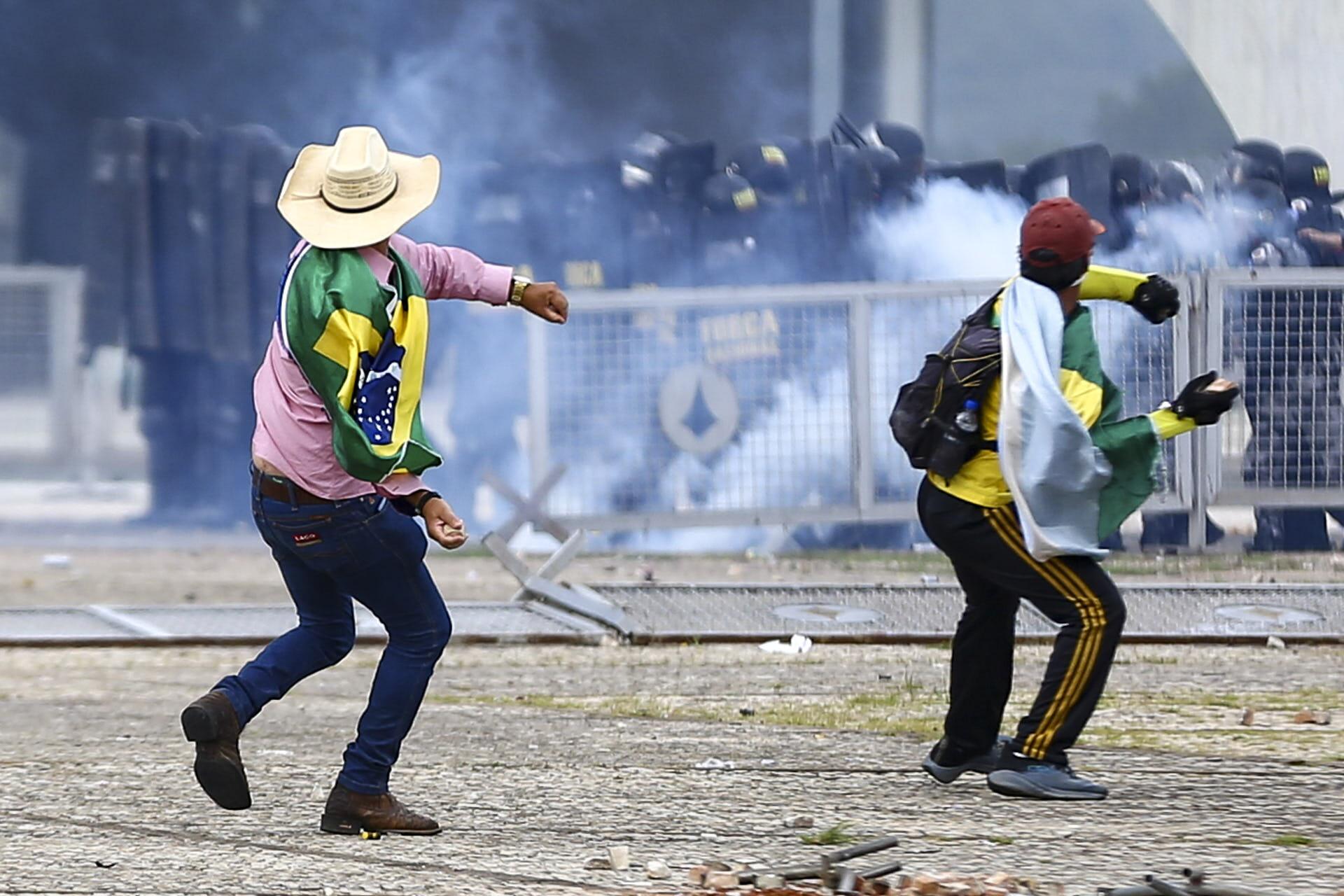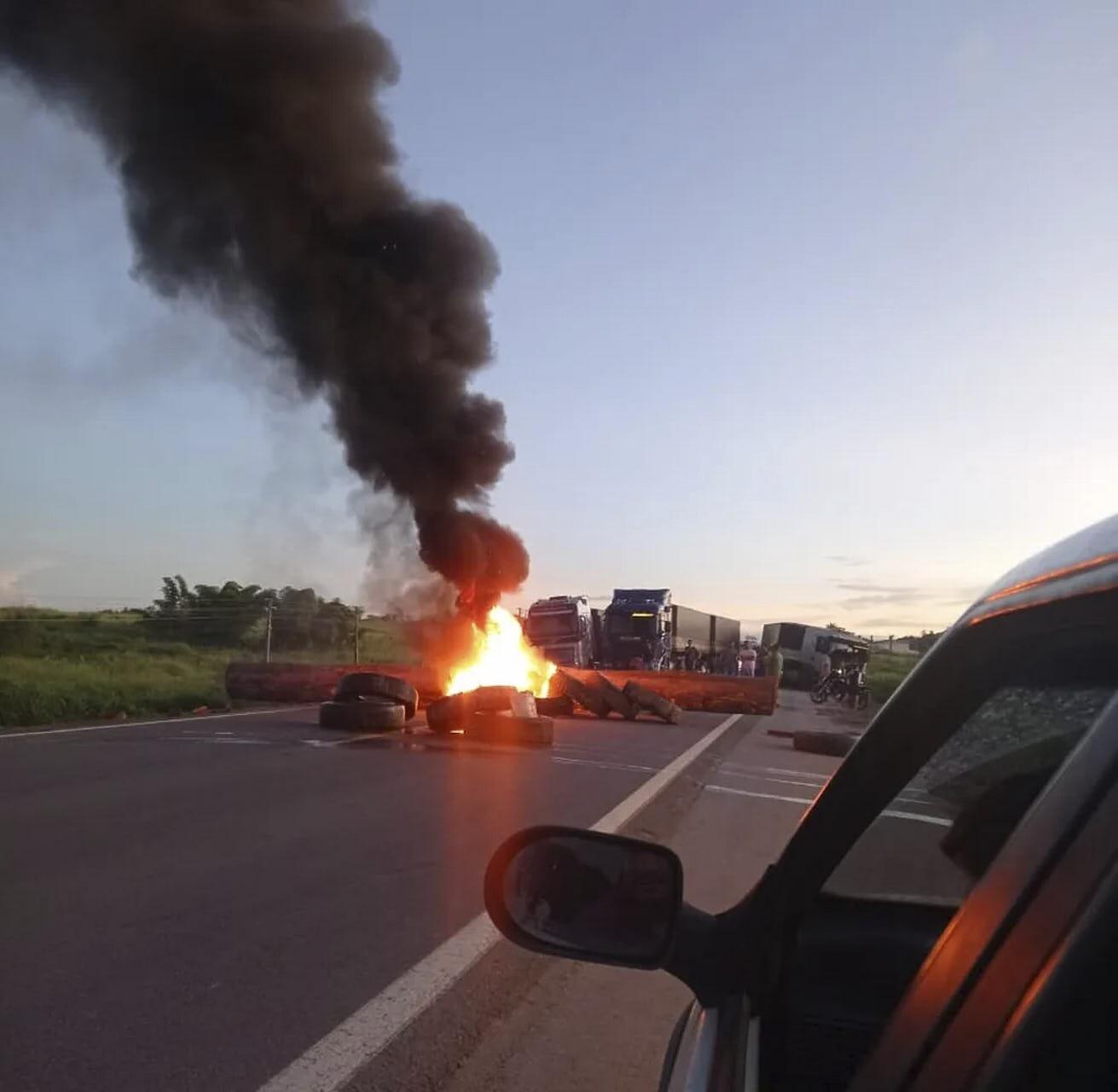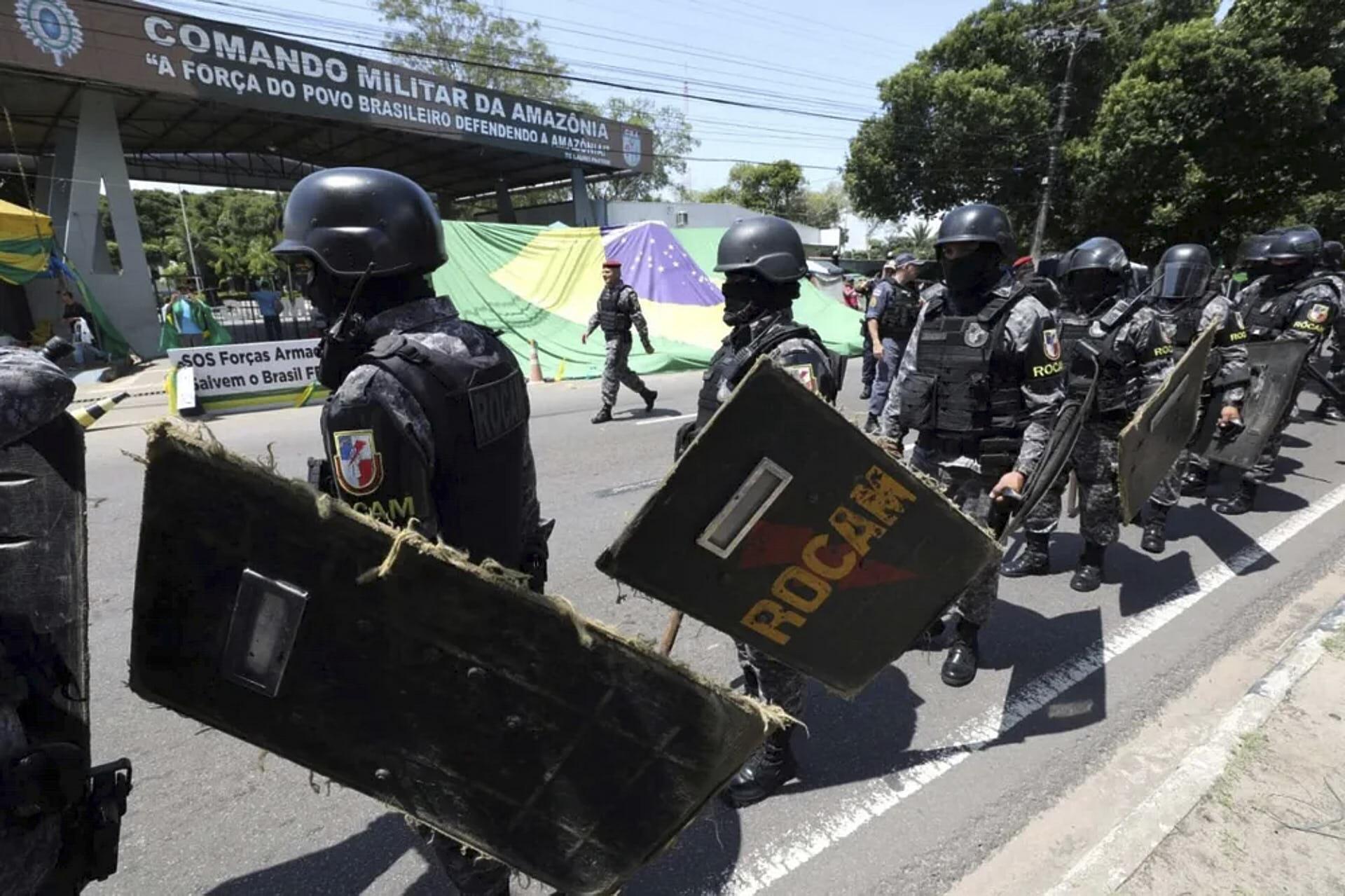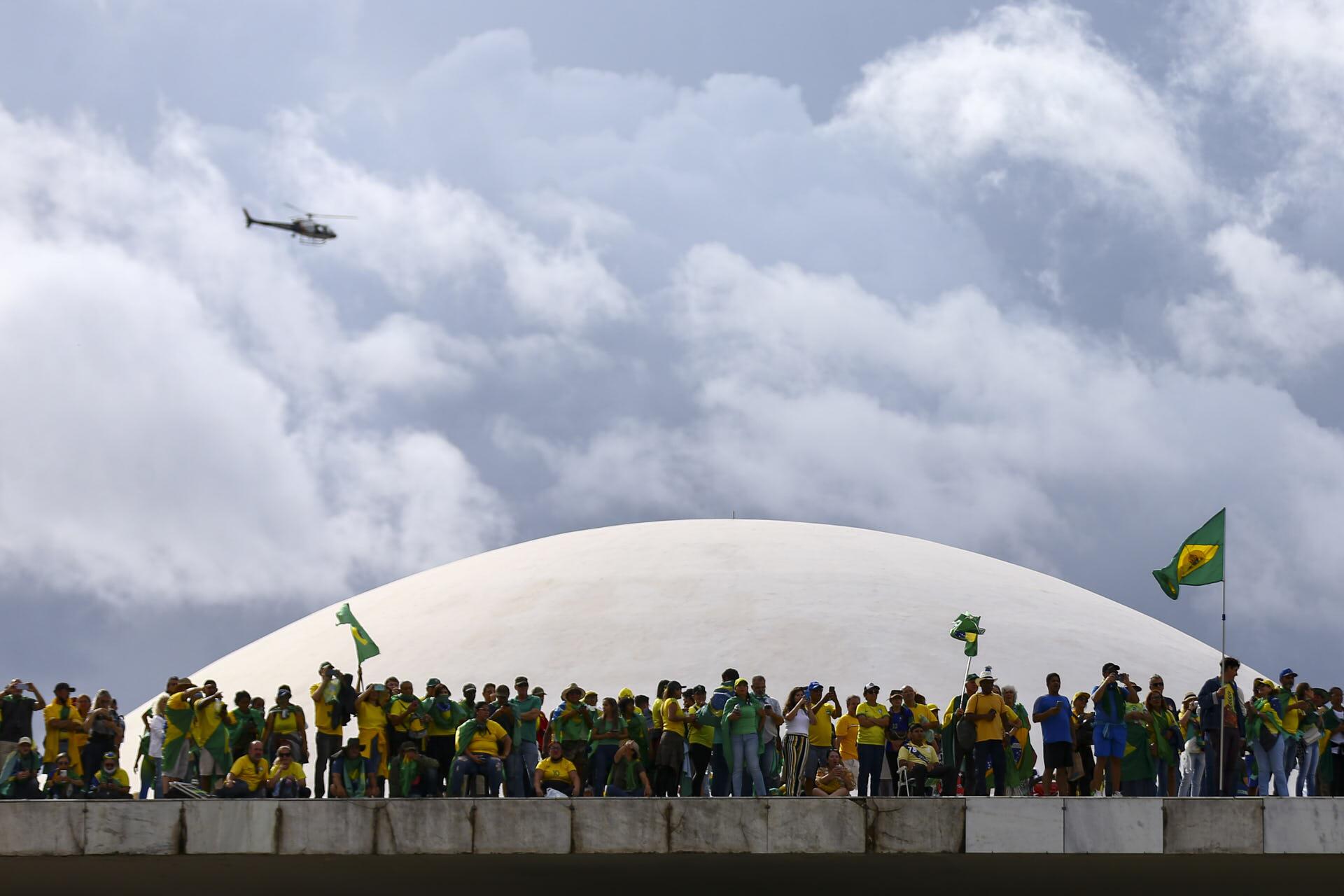In his first public comments after a mob rampaged through the centres of power in Brasilia on January 8, President Luiz Inácio Lula da Silva suggested the insurrection plotters included “evil agribusiness,” as well as illegal loggers and miners. These groups had profited from the accelerated destruction of the Amazon rainforest during the government of Jair Bolsonaro and were strong supporters of the right-wing extremist.
The following day, the Minister of Justice and Public Safety, Flávio Dino, said the involvement of agribusiness elements in the coup attempt was “unequivocal”.
Ongoing investigations should clear up who were the organizers, sponsors and financiers of the criminals in Brasília. Police will build evidence from the testimony of the nearly 1,500 people arrested and the analysis of the contractors of the buses that took the terrorists to the federal capital. The Justice Minister said he already has all of the names of those involved.
There are already indications, however, that the sponsors include people linked to predatory activities in the forest, who are unhappy with Lula’s victory. SUMAÚMA confirmed on Monday that the government was working on this line of investigation. Rede Globo has also reported that some of the detainees have testified to the Federal Police that travel expenses were paid by people from Pará, Rondônia, and Mato Grosso, all of which are states in the Legal Amazon.

Photo: Marcelo Camargo/Agência Brasil
On a broader level, the invasions and destruction in Brasilia are entirely consistent with Bolsonaro’s project of environmental pillage, which had its extreme example in the Amazon. The ultra-rightist encouraged predatory agribusiness, released the largest amount of pesticides since the restoration of democracy in 1988, encouraged the invasion of public lands in the forest, verbally attacked indigenous peoples and quilombolas, promoted illegal mining and denied the climate crisis. Destroying the forest was Bolsonaro’s main project. His followers have wrecked havoc on the symbols of the Republic. In doing so, they also attacked the progressive environmental and indigenous policies of the new president.
In his inauguration the previous Sunday, Lula stated that his goal is zero deforestation of the Amazon. He announced that indigenous lands will be demarcated urgently, and made clear that it is no longer necessary to clear a single hectare more of forest anywhere in the country. This was a clear message that the centuries-old expansion the agricultural frontier must stop. Among his other plans is the transformation of lands, which are currently undesignated, into protected areas. This is a direct challenge to landowners, who enjoyed unprecedented power during the Bolsonaro government. Landowners are an elite group in the Amazon. They occupy mayoral positions and hold senior positions in other public offices and trade associations. Many are absent landlords who live in cities like São Paulo, Goiânia or Brasilia, from where they command their henchmen. Some operate as “grileiro” – the term used for land grabbers who use gunmen, militias or thugs to seize public lands and then forge property titles that they bribe notary offices and public officials to accept. They hold strong power in Congress, which frequently passes legislation that retroactively legalises stolen land so the criminal land-grabbers can claim to be legitimate farmers. They then appropriate more public lands, in a cycle that only ends when the forest is completely cleared or a responsible government intervenes.
Lula’s promise to change this stirred up regional opposition. This was evident at the polls. Of the 7 states in the North region of Brazil, where most of the Amazon is concentrated, Bolsonaro won in 4: Amapá, Acre, Roraima, and Rondônia. In the last three of these, the far-right politician secured, more than 70% of the votes. In the 3 where Lula won, Amazonas, Pará and Tocantins, the current president did not reach 55% of the vote, which points to a divided population.
Since Lula’s victory, states in the North have carried out a series of seditious acts. In Rondônia, a state where Bolsonaro won in every municipality, roads were blocked throughout December, with violence and intimidation. The Federal Public Ministry opened an investigation, which is under secrecy, to investigate the blocking of BR-364 at various points. The same road was also blocked in Mato Grosso. This is the state, where one of the insurrectionists in Brasilia, William Ferreira da Silva ran as a candidate for the state legislators. According to G1, da Silva was among those arrested on Sunday and videos on his social networks show he present during the chaos. He claims he was on vacation in Brasilia and only went to the scene of the riot after hearing about the destruction of federal buildings.

Photo: PRF
In Pará, where roads have also been blocked in recent months, a man was arrested on November 15 in Itaituba with 150,000 Reais in cash, with no proven origin, and dozens of green-and-yellow T-shirts, which are usually worn by coup plotters. A report by the Civil Police of Pará, obtained by Folha de S.Paulo in November, indicated that the acts against democracy initiated after Lula’s victory were financed by numerous businessmen, politicians, and a city attorney. The document pointed to an organized movement that sponsored the Bolsonarists who camped near the 2nd Jungle Infantry Battalion in Belém, calling for a military coup.
The Federal Public Prosecutor’s Office in the state also opened a criminal investigation procedure last year to investigate the coup plot. After more than 60 days, the camp set up in Belem was dismantled on Monday, along with camps in several other states around the country after an order from the Federal Supreme Court President Alexandre de Moraes. Five people were arrested and taken to the Federal Police headquarters for trying to prevent the police from dismantling the tents. On Sunday, BR-163, the Santarém-Cuiabá highway, was again temporarily blocked in Pará at five points, mostly in the city of Novo Progresso, a major Bolsonarist hotbed in the Amazon. In the second round of the October elections, the town ranked second nationally in percentage of votes for Bolsonaro (82.92%). The city’s economy is based on timber extraction, mining and agribusiness.
Last year, Novo Progresso was the site of the most violent anti-democracy demonstrations in Pará. On November 7, a group of Bolsonarists blockaded the BR-163 highway and shot at Federal Highway Police who had been assigned to re-open the road. The attacks are being investigated by the MPF in Pará. Novo Progresso is one of Brazil’s record-breaking municipalities for deforestation. In 2019 it became known worldwide for the “Day of Fire”, a criminal movement which coordinated a wave of arson attacks on the forest, organized via whatsapp by grileiros, ranchers and loggers.
Novo Progresso is a symbol of how forest destruction and politics in the Amazon go hand in hand. In 2020, the then deputy mayor and pre-mayoral candidate, Gelson Dill (MDB), was fined four million reais (US$800,000) for illegally deforesting 174.5 hectares in the Jamanxim National Park, a protected area. Dill, who was elected mayor of Novo Progresso, denies any involvement.

Photo: Alex Pazuello / Secom
Electoral maps from the last presidential elections show Bolsonaro dominated the Amazon municipalities located within the so-called arc of deforestation, an extensive area that runs westward from western Maranhão and southern Pará through the states of Mato Grosso, Rondônia, and Acre.
This includes the municipality of Xinguara, which was the base of,George Washington de Sousa, a Pará businessman who was arrested by the Civil Police of the Federal District on Christmas Eve, after attempting to explode a bomb at Brasilia Airport. According to the police, more explosive materials were found in the apartment the accused occupied in the federal capital. Washington told police he spent 160,000 Reais (US$32,000) on the acquisition of weapons and dynamite in the state of Pará, before traveling more than 1,200 kilometers to the federal capital.
According to Minister Flávio Dinohe, the terrorists who participated in the attacks in Brasilia and their sponsors, who orchestrated the coup from a distance, now face multiple criminal charges: damage to public property, criminal association, bodily injury, attempted violent abolition of the Democratic State of Law, and instigation of a Coup d’Etat.
Jair Bolsonaro, who left the country before the end of his term and took shelter in Florida, in the United States, may also be investigated. The Justice Minister said the former president bears political responsibility. “The former president and his followers have directed attacks on the powers that be,” he said. As yet, there has been no request to extradite Bolsonaro to Brazil.
In the United States dissatisfaction with the presence of the right-wing extremist is growing. The memory of the invasion of the Capitol building in Washington DC, on January 6, 2021, when followers of Donald Trump unhappy with his defeat by Joe Biden attempted a coup d’état, is still traumatic. The attempted coup in Brazil this January 8 is seen internationally as Brazil’s Capitol moment. Representatives Alexandria Ocasio-Cortez and Joaquin Castro of the Democratic Party called on Twitter for Jair Bolsonaro to leave the United States.
In Brazil, thousands of protesters occupied Paulista Avenue in São Paulo on Monday night, as well as other Brazilian capitals. With cries of “No amnesty!”, the demonstration condemned the coup attempt and demanded the terrorists be held accountable. Another cry was “We want Bolsonaro in prison.”
When he was head of state, Bolsonaro became an international pariah due to his hate-mongering, callous response to covid and promotion of environmental destruction. Today he has lost the privileges of a head of state, yet he remains a pariah both on global stage, and – after the attempted coup on January 8 – within his own country.
Translated by Jonathan Watts

Photo: Marcelo Camargo/Agência Brasil





